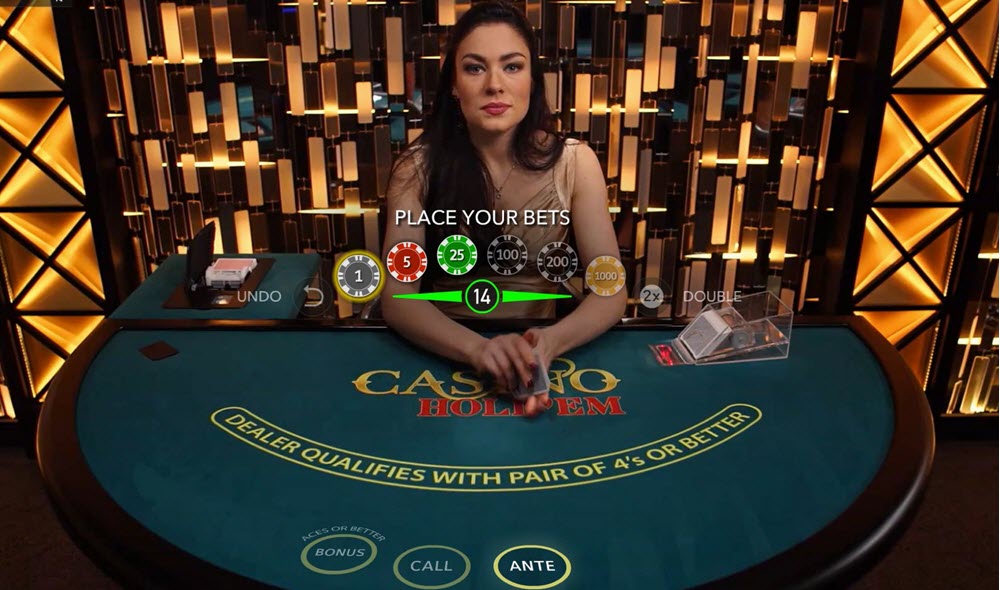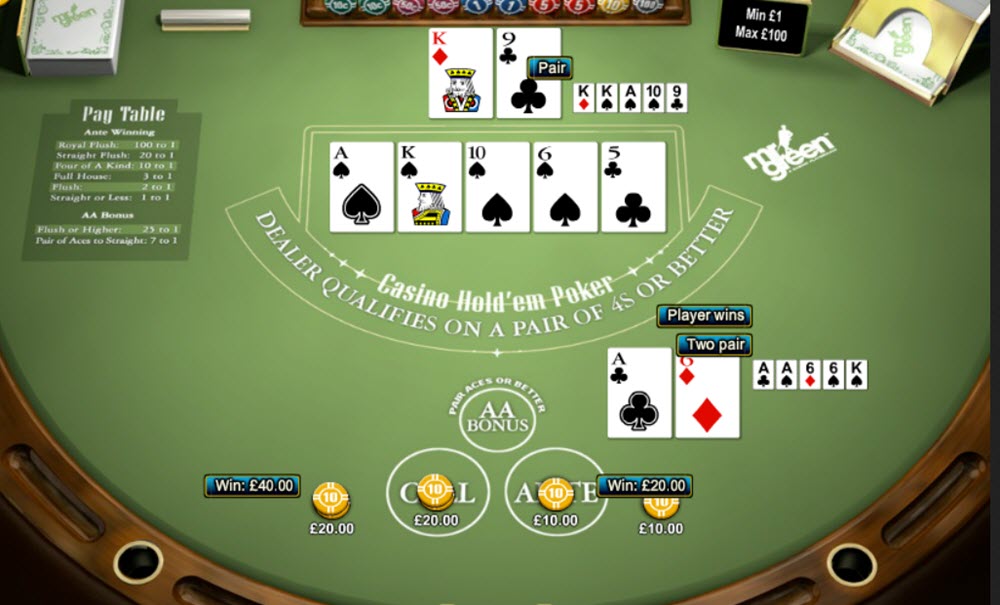Casino hold’em
On this page:
Casino Hold’em is a type of casino poker (single-player poker) inspired by Texas Hold’em poker, which in turn is a type of poker that evolved in the 20th century and became one of the most popular types of poker, both live and online, in the early years of the 21st century.
With Casino Hold’em, you are only playing against the house – not against other players.

Poker hand rankings
Casino Hold’em uses the same poker hand rankings as Texas Hold’em.
- Royal Flush – A hand of AKQJT all in the same suit. Example: AKQJT in only spades.
- Straight Flush – Five consecutive cards all in the same suit. Example: 76543 in only clubs.
- Four of a Kind – A hand that contains four cards of the same rank. (The fifth card doesn’t matter) Example: JJJJ4.
- Full House – A hand with three cards of one rank and two cards of another. Example: JJ222.
- Flush – Five cards of the same suit in no particular order. Example: K9842 in only hearts.
- Straight – Five consecutive cards of at least two different suits. Example: 98765 in a mix of hearts and clubs.
- Three of a Kind – A hand with three cards of the same rank. (The other two cards do not matter.) Example: KJJJ2.
- Two Pair – When a hand holds two sets of two cards of matching ranks. (The fifth card doesn’t matter.) Example: QQ933.
- One Pair – A hand with one set of two cards of matching rank. (The other three cards do not matter.) Example: Q99542
- High Card – A hand that does not match any of the above. Example: KJ532 of at least two different suits. When two high-card poker hands are compared to each other, the one with the highest top card wins. This means that KJ532 would win over QJ985.
The basics
Casino Hold’em is a game where each player, and the dealer, gets two private cards (hole cards). Then, a total of five cards are placed face-up on the table, and they are communal cards – anyone can use any number of these cards to form their own best poker hand.
Unlike Omaha Poker, including communal cards is not mandatory in Texas Hold’em and Casino Hold’em. So, if you, for instance, have two aces as your hole cards, you might win the pot with just them, without any help from the communal cards.
Casino Hold’em is about having a better poker hand than the dealer. How great the hands of the other players are doesn’t matter, since you aren’t competing against them.
A round of Casino Hold’em
- The players at the table make their initial wager. This wager i called ante.
- Each player can also elect to make a small side bet, which goes to feed a progressive jackpot. You can only win money from this jackpot if you have made the side bet.
- Each player, and the dealer, get two cards from the deck. They are called hole cards. You can’t know the dealer’s hole cards, because they are dealt face down.
- The dealer places three cards, face-up, in the middle of the table. These are the first three community cards, and they are known as the flop.
- Each player must now either fold or bet. If you fold, the round is over for you, and you have lost your ante (and any side bet).If you bet, you stay in the game. You must place a wager that is exactly twice the size of your ante. This bet is also known as the raise.
- The dealer places two additional communal cards face up on the table. They are known as the turn and the river.
- If the dealer qualifies, your poker hand will be compared to her poker hand. If your poker hand is higher than the dealer, you win and get paid on both ante and raise. If it is lower, you lose. If it is of exactly the same ranking, it’s a tie (in most casinos).If the dealer doesn’t qualify, your hand gets paid on the ante, regardless of how good or poor your hand is.

When does the dealer qualify?
In most casinos, the dealer only qualifies if her hand is a pair of fours or higher.
Examples:
- The dealer’s best possible poker hand, with or without the help of community cards, is a pair of threes. She doesn’t qualify.
- The dealer’s best possible poker hand, with or without the help of community cards, is a pair of fours. She does qualify.
What can I win?
When the dealer doesn’t qualify
- You get to keep the raise, but doesn’t get paid on it.
- You get paid on the ante, in accordance with the ante pay table. (See below.) The smallest possible payment is 1:1 on the ante.
When the dealer does qualify, and your hand is better than hers
- You get paid 1:1 on the raise.
- You get paid on the ante, in accordance with the ante pay table. (See below.) The smallest possible payment is 1:1 on the ante.
The Ante Pay Table
- Royal Flush or Straight Flush – 20:1
- Four of a kind – 10:1
- Full House – 3:1
- Flush – 2:1
- All other hands – 1:1
This is a commonly used Ante Pay Table, but always check the applicable rules at your specific Casino Hold’em table before you start playing, because some casinos use another Ante Pay Table.
The Progressive Jackpot
Casino Hold’em tables usually come with a progressive jackpot. In some casinos, a multitude of Casino Hold’em tables are connected to the same pooled progressive jackpot, to make it grow even quicker.
You decide if you want to make the side bet that goes to feed the jackpot. You can only win money from the progressive jackpot if you have made the side bet.
Always check the Progressive Jackpot Paytable at the table before you make any decision, because they do vary between different casinos and sometimes even from one table to the next within the same casino. Also, check if the progressive jackpot will pay even when the dealer doesn’t qualify.
Here is one example of what a Casino Hold’em Progressive Jackpot Paytable can look like:
- A seven-card Straight Flush – You win the progressive jackpot
- A six-card Straight Flush – You get paid 5,000:1 on your ante
- A five-card Straight Flush – You get paid 250:1 on your ante
- Four of a Kind – You get paid 50:1 on your ante
- Full House – You get paid 5:1 on your ante
- Flush
Casino hold’em
– You get paid 4:1 on your ante
- Straight – You get paid 2:1 on your ante
- All Other Hands – No payout from the progressive jackpot